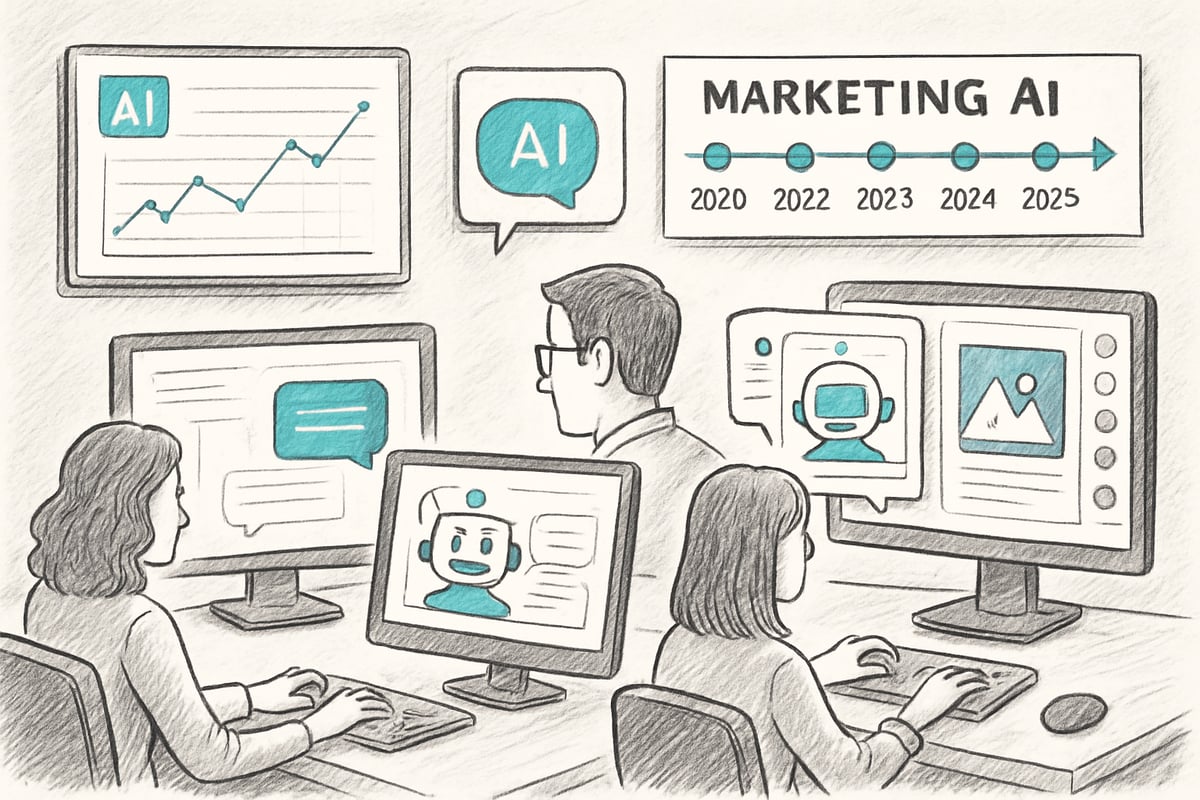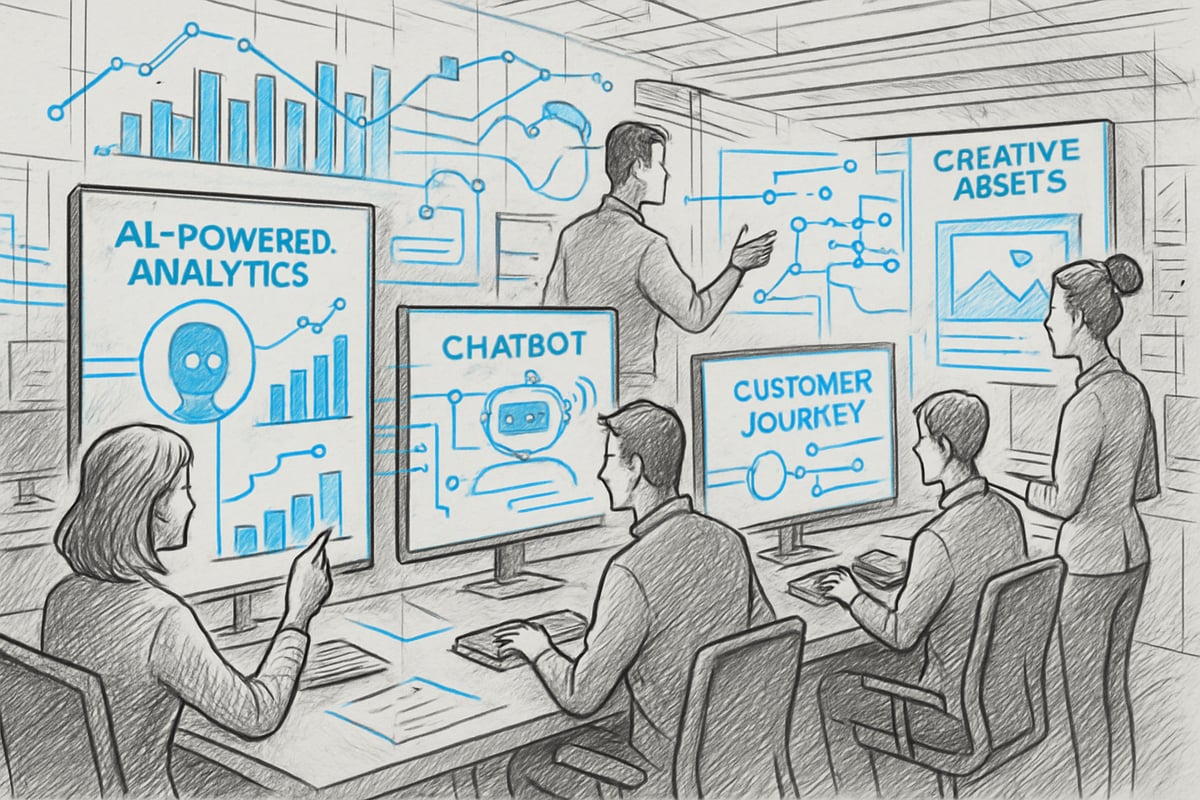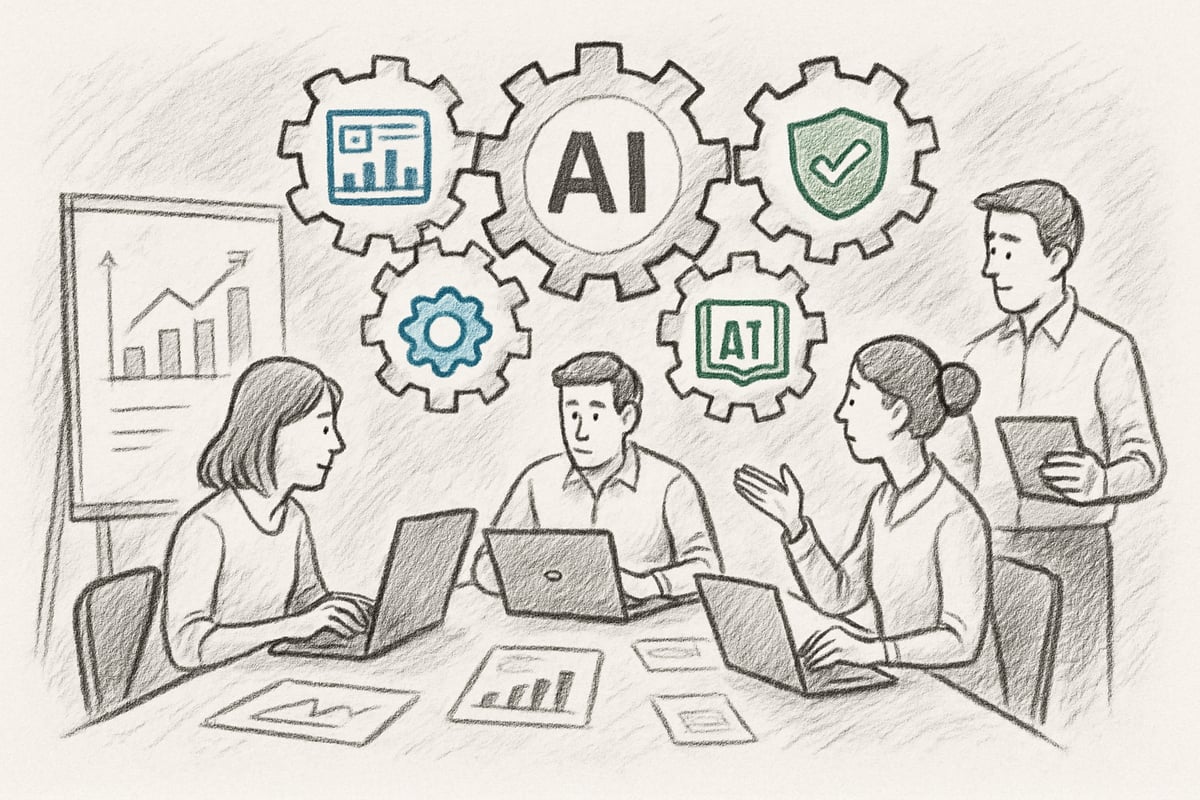Artificial intelligence is redefining the pace of change in marketing and business as we enter 2025. The rise of marketing ai is not simply a passing trend, but a fundamental revolution in how businesses operate, compete, and connect with their customers.
Today, marketing ai powers everything from hyper-personalized experiences and predictive analytics to automated content creation and real-time campaign management. The results are visible in every industry, with companies achieving unprecedented efficiency, deeper customer engagement, and measurable growth.
Want to know how this transformation plays out in practice? Discover the 10 ways marketing ai is revolutionizing business in 2025, and learn how your organization can lead the charge into the future.
The State of Marketing AI in 2025
Marketing ai has reached an inflection point in 2025, transforming how organizations operate, strategize, and engage with customers. In this section, we explore the pivotal changes shaping the marketing landscape, from rapid technology adoption to the profound shift in team dynamics and required skills.

Evolution of AI in Marketing
From 2020 to 2025, marketing ai has evolved from experimental pilots to a central pillar of business strategy. The rise of large language models like ChatGPT, Gemini, and Claude has revolutionized content generation and customer engagement.
Major platforms such as Shopify and Amazon have mandated the use of ai tools in daily operations, accelerating industry-wide adoption. The proliferation of ai-driven marketing platforms has integrated predictive analytics, automation, and personalization directly into marketing stacks.
According to the 2024 State of Marketing AI Report, the pace of adoption has surged, with marketers now embedding ai into nearly every workflow. This foundational shift is setting new standards for efficiency and innovation across the sector.
AI’s Impact on Marketing Roles and Teams
The adoption of marketing ai has redefined team structures and roles. Manual, repetitive tasks are now automated, freeing marketers to focus on strategy and creative innovation.
Roles like copywriting, design, and campaign management have shifted toward data-driven decision-making. Teams experience significant productivity gains, rapidly prototyping campaigns and collecting client feedback with ai support.
However, challenges persist. There is a growing talent gap, as the demand for ai literacy outpaces available training. Organizations must prioritize upskilling to ensure their teams can fully leverage marketing ai’s capabilities.
Key AI Marketing Tools Used in 2025
Marketers in 2025 rely on a suite of advanced marketing ai tools to drive results. Leading platforms include:
- HubSpot: Integrates ai for campaign management and analytics.
- Jasper AI: Generates high-performing content in various formats.
- Surfer SEO: Optimizes content for search in real time.
- Blaze: Powers cross-platform audience targeting and segmentation.
- Adobe Sensei: Delivers actionable insights for customer journey mapping.
A notable trend is the seamless integration of these tools within multi-platform workflows. Features like predictive modeling, workflow automation, and real-time insights have become standard, allowing marketers to optimize campaigns efficiently and at scale.
Challenges and Opportunities
With the rise of marketing ai, businesses enjoy increased ROI, accelerated innovation, and stronger customer relationships. Opportunities abound for those who harness ai’s full potential.
Yet, there are significant challenges. Over-reliance on automation can erode the human touch, and privacy and ethical concerns are top of mind. The automation of entry-level roles raises questions about nurturing the next generation of talent.
Despite the benefits, a majority of marketers still underutilize ai, as highlighted in recent studies. Addressing these issues is critical for sustainable growth and responsible deployment of marketing ai.
Data and Adoption Trends
Recent data shows a dramatic surge in marketing ai adoption. Most marketers report they "couldn’t live without ai," reflecting its essential role in daily operations.
However, investment in ai talent and comprehensive training still lags behind technology adoption. Leaders like Tobi Lütke, CEO of Shopify, have issued internal memos emphasizing the need for widespread ai tool adoption among staff.
Looking ahead, marketing ai is poised to become a must-have skill, not just a competitive advantage. Businesses that invest in both technology and people will be best positioned to lead in the evolving digital landscape.
10 Ways Marketing AI Is Revolutionizing Business in 2025
In 2025, marketing ai is fundamentally transforming how businesses operate, compete, and engage with customers. The following ten innovations showcase how marketing ai is not just a tool, but a catalyst for measurable business growth and competitive advantage.

1. Hyper-Personalization at Scale
Marketing ai has redefined personalization, moving beyond static segments to real-time, individual-level engagement. AI systems instantly analyze browsing habits, purchase history, and behavioral signals to deliver tailored experiences.
For example, Netflix and Amazon use advanced recommendation engines powered by marketing ai to suggest content and products users are most likely to love. Dynamic emails, personalized web pages, and targeted ads now adapt in real time as users interact.
Stat: Personalization driven by marketing ai increases engagement, with brands reporting higher loyalty and repeat purchases.
Key use cases include e-commerce, streaming, SaaS, and direct-to-consumer brands, where 1:1 marketing is both cost-effective and scalable. Today, customers expect this level of personalization, and businesses leveraging marketing ai are meeting—and exceeding—those expectations.
2. Predictive Analytics & Forecasting
With marketing ai, predictive analytics has become a core driver of marketing success. AI models analyze historical and live data to predict future trends, enabling marketers to act proactively.
B2B companies now use marketing ai to score leads, forecast campaign outcomes, and identify high-value prospects. Real-time adjustment of messaging and offers is possible based on forecasted trends.
Stat: Predictive analytics powered by marketing ai boosts conversion rates and ROI, allowing teams to anticipate rather than react.
Integration with CRM and automation platforms ensures that marketing ai insights are actionable. Staying ahead of competitors is now about anticipating market shifts, not just reacting to them.
3. Automated Content Creation & Optimization
Marketing ai tools like Jasper and Surfer SEO are revolutionizing content workflows. These platforms generate blog posts, ad copy, emails, and even video scripts using natural language processing.
For instance, Jasper AI produces high-converting copy in multiple tones, freeing marketers from repetitive writing tasks. Marketing ai also optimizes content for SEO, readability, and engagement, ensuring every asset performs at its best.
Stat: Marketers save hours each week as marketing ai automates content creation and optimization.
With seamless integration into CMS and publishing platforms, marketing ai reduces human error and maintains consistency. Content velocity, driven by marketing ai, is now a critical competitive advantage.
4. Intelligent Customer Journey Mapping
Marketing ai excels at mapping and analyzing the increasingly complex customer journey across multiple channels. AI identifies friction points, optimizes conversion paths, and adapts journeys in real time.
Adobe Sensei, for example, offers actionable analytics on customer touchpoints, revealing where users drop off or engage. Organizations using marketing ai for journey mapping see higher retention rates and deeper loyalty.
Personalizing interactions across email, web, and social media is now seamless. Marketing ai also enables hyper-targeted retargeting and nurturing, adapting each journey based on user behavior.
Key insight: Deep customer understanding, powered by marketing ai, drives both loyalty and revenue growth.
5. AI-Powered Chatbots and Virtual Assistants
Advanced chatbots, built on marketing ai, now handle complex queries, recommend products, and even process transactions. E-commerce brands deploy ChatGPT-powered bots that offer 24/7 support, instantly improving customer satisfaction.
With marketing ai, chatbots are multilingual and context-aware, providing seamless service across websites, apps, and social platforms.
Stat: AI chatbots reduce support costs and response times, making them indispensable for scalable service.
Industries from retail to healthcare now rely on marketing ai for always-on customer support. Bots have become essential for delivering quick, accurate, and personalized assistance at scale.
6. Real-Time Social Listening & Sentiment Analysis
Marketing ai enables instant analysis of millions of social posts, reviews, and mentions. AI-powered tools like Brand24 and Gumloop detect trends, crises, and shifts in brand sentiment in real time.
Rapid identification of influencers and advocates is now possible with marketing ai, supporting agile reputation management.
Stat: Real-time social listening allows brands to respond quickly to PR issues, reducing reputational risk.
Integration with campaign management platforms ensures insights are actionable. Social intelligence, delivered through marketing ai, has become mission-critical for brand health and competitive edge.
7. Automated Campaign Management & Optimization
Marketing ai automates essential campaign tasks, including A/B testing, budget allocation, and channel selection. Platforms like HubSpot and Optmyzr use AI to predict which creatives and messaging will perform best.
Stat: AI-managed campaigns deliver higher ROI compared to manual campaigns, freeing marketers to focus on strategy.
Marketing ai enables real-time optimization based on live data, reducing manual workload and improving outcomes. This automation is now standard in PPC, social ads, and email marketing.
Key insight: Marketing ai liberates teams to prioritize creative strategy over execution, driving better results.
8. Enhanced Data Analysis & Reporting
With marketing ai, data analysis moves from manual spreadsheets to automated, actionable insights. Google Marketing Platform’s AI dashboards process both structured and unstructured data, visualizing KPIs and performance trends.
Stat: Marketers using marketing ai gain deeper insights faster, empowering smarter business decisions.
Complex analytics are now accessible to non-technical stakeholders, thanks to clear data visualizations and automated reporting. Marketing ai integration with BI tools and CRMs ensures every decision is data-driven.
Key insight: The speed and accuracy of marketing ai-driven insights enable agile business responses.
9. AI-Driven Creative Generation
Generative marketing ai tools create images, videos, and audio assets on demand. Platforms like Synthesia and Lexica Art empower marketers to rapidly prototype and iterate creative content.
Stat: Creative production time is cut by up to 70% when using marketing ai.
This technology reduces dependence on agencies and freelancers, allowing for fast, personalized content across channels. Marketing ai democratizes creativity, enabling more voices and faster campaigns.
Key insight: Marketing ai accelerates and scales creative output, making it accessible to every team.
10. Smarter Audience Segmentation & Targeting
Marketing ai analyzes vast datasets to create micro-segments based on psychographics and behaviors, not just demographics. Tools like HubSpot and Blaze deliver dynamic, real-time audience targeting.
Stat: Hyper-targeted ads powered by marketing ai convert at significantly higher rates.
With lookalike and predictive modeling, marketing ai adjusts segments as new data emerges, supporting omnichannel strategies.
Key insight: Precision targeting with marketing ai maximizes marketing spend efficiency and campaign ROI.
To learn more about how these innovations are reshaping strategies, see AI for Marketing Explained for a comprehensive overview.
Integrating AI Into Your Marketing Stack: Best Practices & Considerations
Successfully weaving marketing ai into your business demands a thoughtful strategy, ethical vigilance, and a readiness to embrace change. Below are actionable best practices and key considerations for building a sustainable, high-performing AI-powered marketing stack.

Building a Future-Proof AI Marketing Strategy
Laying a strong foundation for marketing ai starts with a clear assessment of your current workflows. Identify where AI can automate routine tasks or deliver deeper insights. Prioritize tools that integrate smoothly with your existing platforms, such as HubSpot or Google Workspace.
Invest in ongoing training so your teams understand both the capabilities and limitations of marketing ai. Set measurable KPIs to track progress, like campaign ROI or customer engagement rates. Align AI initiatives with core business objectives and customer needs.
For a deeper dive into aligning your business strategy with artificial intelligence, explore Marketing and AI Integration for practical guidance and examples.
Addressing Ethical, Privacy, and Security Concerns
Responsible use of marketing ai is essential to maintain trust and compliance. Always ensure your AI tools adhere to regulations like GDPR or CCPA. Choose vendors with robust data encryption and transparent data usage policies.
Be proactive about mitigating algorithmic bias. Conduct regular audits of AI-generated content and decision-making processes. Communicate openly with customers about how their data is used in marketing ai applications.
Build trust by offering opt-in features and clear privacy controls. Monitor for emerging risks, such as deepfakes or automated misinformation, and update your security protocols regularly.
Overcoming Adoption Barriers
Adopting marketing ai often encounters hurdles such as lack of training, limited budget, or resistance to change. Executive sponsorship and a culture of continuous learning are crucial to overcome these barriers.
Start with pilot programs and scale up as teams gain confidence. Leverage vendor resources and community forums for troubleshooting and inspiration. According to the State of AI in Digital Marketing Report, organizations that prioritize education and experimentation see faster and more sustainable returns from marketing ai investments.
Encourage feedback and adaptability as new tools and challenges emerge. Flexibility is key to long-term success.
The Future Outlook: What’s Next for Marketing AI?
The future of marketing ai is defined by rapid innovation and evolving roles. Expect deeper personalization, more autonomous campaigns, and seamless collaboration between humans and AI systems.
Prepare your teams for ongoing change by fostering curiosity and upskilling. Make marketing ai a core competency, not a side project. Businesses that adapt quickly will set themselves apart in a crowded market.
Stay informed on the latest advancements, and maintain a proactive mindset to fully leverage the transformative power of marketing ai.
